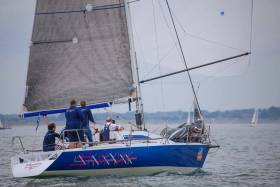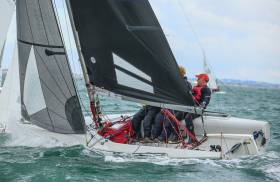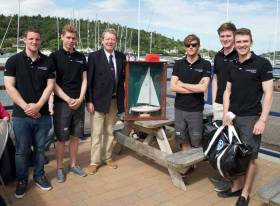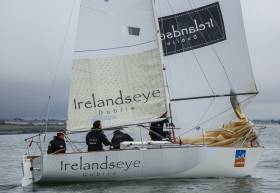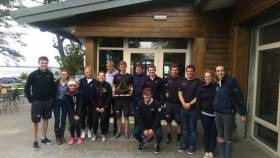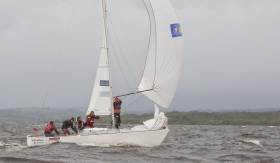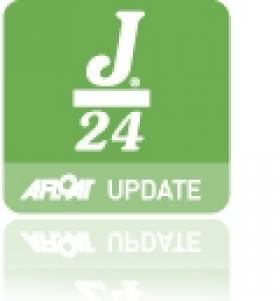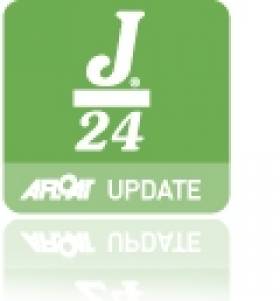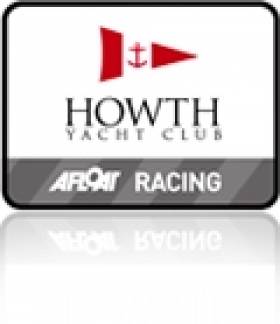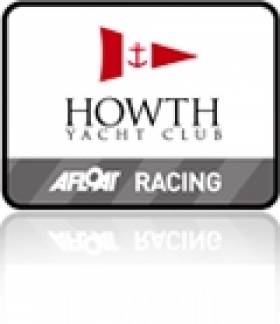Displaying items by tag: J24
Final Call For ICRA National Championships: Reduced Entry Fee Discount Closes on Friday
The ICRA Cruiser National Championships reduced entry fee registration of €150.00 will end this Friday 12th May, just a month before the event sets sail at Royal Cork Yacht Club from 9th – 11th June. The final closing date for entry is the 26th May. Enter online here.
As of today, ICRA estimates over sixty percent of the expected boats have entered the championships. 'Thanks to all the boats that have entered so far as this assists greatly with the planning of the event', ICRA Commodore Simon McGibney told Afloat.ie
The J24 Association of Ireland will be hosting their Southern Championships during the event and the Quarter tonner will in addition to be racing in division but also will be racing for the Quarter Ton Cup.
The 2017 Spring Warmer series sponsored by Key Capital Private came to a conclusion at Howth Yacht Club on Saturday. The final day of the season opener provided the sailors with some champagne sailing conditions with 15–knots of breeze and glorious sunshine.
In the Cruiser Class Paddy Kyne’s Maximus with two race wins took the honours by one point from the very consistent Flashback (Patterson/Paddy Gregory /Don Breen). In third place was Stephen Quinn’s Lambay Rules.
The J24 racing was dominated by Steve Atkinson’s Bad with three first places and a fourth. Second was Jumpin Jive (M. Usher). The new K25 team completed the podium. It was great to see three K25 youth teams out competing.
Howth Yacht Club’s “Taste of Sailing” initiative goes from strength to strength. The programme sees experienced sailors racing with those new to the sport or new to HYC. Five teams took to the club J80s for the Spring Warmer this year.
The SB20 fleet was the largest fleet with 10 boats. Locals Shane Murphy, Daragh Sheridan and John Phelan on Two Men & Their Monkey won the event with a race to spare from Colin Galavan’s Sacrebleu who scored a race win in the final race with a fantastic first run setting them up for a big lead which they never relinquished. Third place was Dave Barry on Lia.
The SB20s are staying in the same venue for their Eastern Championships to be held in two weeks’ time on 21 & 22 April.
The prizegiving took place with Vice Commodore Emmet Dalton on hand to present the prizes.
ICRA Nationals Bring J/24 Southerns into the Mix
This year the J/24 Southern Championships will return to Cork Harbour for the third consecutive year with the added incentive to participate as the ‘Southerns’ will run in conjunction with the ICRA Nationals at the Royal Cork Yacht Club.
This will extend the championship from a two day to three day event and racing under the ICRA banner means National Titles are also up for grabs in both IRC and ECHO, within the division. The Frank Heath Trophy will be presented to the winners of the Southern Championship, based on results extracted from IRC.
In close collaboration with other clubs RCYC have agreed with Foynes Yacht Club that boats participating in the J/24 Western Championships at the end of May will be able to leave their boats at the Foynes club until the ICRA Nationals just a few weeks later. While in the area, there is an option to do a third event, with Sovereign’s Cup taking place in Kinsale at the end of June, and again free storage between events.
The J/24’s have been seeing something of a revival in recent years and it’s hard not to see the allure. A boat that can be trailer sailed and needs a crew of just five eliminates many of the headaches of owners of bigger boats. The J/24's are often described as ‘tweaky’ boats which take a bit of getting used to but for the sailors who want to improve their racing skills and understanding of rig tuning, weight displacement etc. these are a brilliant and very affordable option. As with any one design fleet, racing is highly competitive and mistakes can be costly in relation to results but that’s part of the fun, a real measure of sailing skills!
There is also a fantastic social side to the après sailing. Under the leadership of the Irish J/24 Class Association President Flor O’Driscoll you will find an extremely welcoming association with the more experienced J/24 sailors happy to share their knowledge over a pint at the bar. There will be entertainment at the Royal Cork Yacht Club after sailing each evening with BBQ or sit down dinner options available, so plenty of opportunity to analyse the days racing and pick the brains of fellow sailors. Running alongside a major national event will surely augment the craic and can only make for a better weekend of sailing!
The Carrigaline Court Hotel are offering a fantastic deal with a Room Only Rate (per night) of Single €85.00, Double/Twin €99.00, Triple €109.00. Bed and breakfast and evening meal options also available. Please quote ‘IRC National Championships’ when booking.
The early bird entry fee of €150 is still available. ICRA and RCYC would ask all competitors to book as soon as possible to facilitate better planning of the event.
Howth Yacht Club's Team 'Ireland's Eye Kilcullen' Graduate from the K25 Squad in Style
Whatever about all the other sailing around Howth Yacht Club, there are few who would dispute that one of the biggest HYC stories this year is the success of this J24 team.
Following their unprecedented success over the past months and years, the Ireland's Eye Kilcullen team threw a typically 'understated' celebration in Howth Yacht Club last Saturday night. Many of this team were founder participants in the K25 (under 25) programme when it was initiated in 2009 and now see themselves not only as successful graduates, but they've also developed and set the standard at the very highest level for those youth sailors from Howth following behind them.
In an extraordinarily short few years to the end of August this year and in addition to their numerous regional titles, the Ireland's Eye Kilcullen team held J24 National titles, ICRA National title, Match Racing National title (with former team member Ryan Scott), twice J24 European Under 25 winners, European IRC silver medal and won J24 European Championship bronze recently. Their last spectacular accomplishment in retaining their J24 National title in Dun Laoghaire recently seemed to slip past most of the sailing press's notice, where they sailed a flawless national championship series to win the title with seven straight race wins.
Most of this team will now be stepping down to make way for the next aspiring group of teenage and youth sailors motivated to replicate their success. As the remainder of the team now reaches 25 years of age, the youngest team member (Cian Manley) is empowered with forming and bringing one of the next teams through.
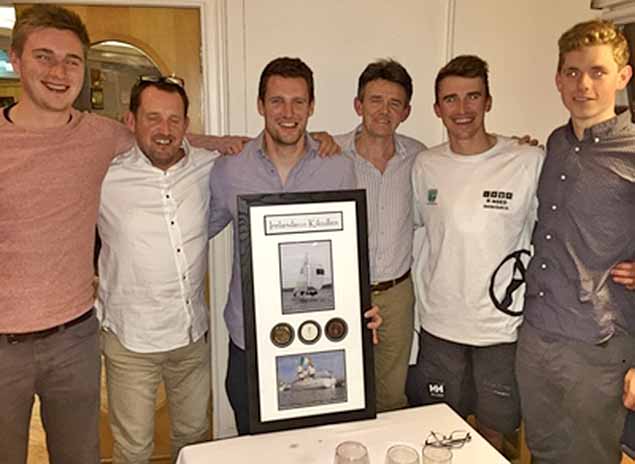 Cian, Gordon, Sam and Cillian presenting Brendan and Paul O'Sullivan of Ireland's Eye (2nd and 4th from left) with a framed momento from their highly successful year Photo: HYC
Cian, Gordon, Sam and Cillian presenting Brendan and Paul O'Sullivan of Ireland's Eye (2nd and 4th from left) with a framed momento from their highly successful year Photo: HYC
So what happens in the lives of these guys next? It was always possible that the K25 initiative would seed opportunities for those wishing to join the professional sailing circuit and Luke Malcolm seems to have relished this prospect, as he's currently spending the remainder of this year doing many of the RYA accreditation modules in the south of England. In tactician and sport science graduate Gordon Stirling, the K25's loss is Ulster Rugby's gain, because 'Gordo' is now working with them as Strength and Conditioning Coach. Having been one of HYC's youngest Senior Instructors just a few short years ago, helmsman Cillian Dickson will now be applying his time to concentrate on studying for his Actuarial Science Degree. The final member of the 'retired' team is Sam O'Byrne, who's own 'DropChef' business with another former K25 member (Ryan Scott) will undoubtedly flourish under the Howthman's relentless energy.
Acknowledging the support given to the squad since it's inception, the guys were quick to thank The gift to Ireland's Eye Knitwear included gold, silver and bronze medals won by the team. The gift to Ireland's Eye Knitwear included gold, silver and bronze medals won by the team their sponsors including local knitware company 'Ireland's Eye' - presenting Brendan and Paul O'Sullivan with a specially framed photo set integrated with gold (ISA National J24 title), silver (IRC Europeans) and bronze (J24 European) medals. In addition to hosting dinner in the club for the sponsors, they invited K25 mentors Brian McDowell and Fergus O'Kelly and former HYC Commodore Brian Turvey, to thank them and the club for their support of this hugely successful youth initiative. The team was also quick to thank coach Graeme Grant and others such as Paddy Gregory and Ian Malcolm for their help with logistics.
Brian Turvey praised the team for the way in which they applied themselves and developed as an extraordinarily capable force not just in terms of race results but also as ambassadors for Howth Yacht Club.
With the provision of three J24 keelboats (by Enda O'Coineen and Brian McDowell) and access to the HYC's five new J80s, the K25 initiative continues to build and young sailors interested in developing their sailing skills in a team-focused environment with a view to high-performance achievement should contact [email protected] for further information.
J/24 Westerns Title Goes To Howth Yacht Club
#J24 - Team Ireland's Eye Kilcullen brought the J/24 Westerns title to Howth Yacht Club this weekend in the event's first running since 2014.
Three Howth K25 teams took to the waters at Lough Ree on Saturday (6 August), where Team Ireland's Eye Kilkullen led after four races.
Johnny Bravo also scored two thirds and a fourth to place them well for fourth overall on conclusion of racing yesterday (Sunday 7 August).
A Howth Yacht Club J24 team won last weekend's Northern championships at Sligo YC with a race to spare. The K25 team beat JP McCaldin's Jamais Encore from Lough Erne Yacht Club for the top slot in a 19–boat fleet. Flor O'Driscoll's HArd on Port from the Royal St. George YC was third. Results are downloadable below.
Currently, the winning K25 team are in Poole in Dorset, a major J24 centre and are aiming to defend their ICRA title on home waters next month.
Lough Erne J24 Wins Royal Cork Southern Championships
#j24 – With four race wins from six race sailed the furrthest travelled J24 won the class southern championships at Royal Cork Yacht Club (RCYC) today. Lough Erne's JP McCaldin from County Fermanagh in Northern Ireland beat the Royal St.George's Hard on Port skippered by Flor O'Driscoll. Third was Howth Yacht Club's Kilcullen (Gordon Stirling). Full results in the seven boat fleet are downloadable below.
Saturday morning South of Roche's Point saw a breeze of 18 to 20 knots for the first race of the J24 Southern Championship. Race Officer Ciaran McSweeney kept everybody on their toes, sounding the first gun at 10.30 as posted, catching a few competitors off guard. JP McCaldin and his crew on Jamais Encore dominated the first race with local boat YaGottaWanna showing good boat speed to claim a second place. Current Irish Champion FlorO'Driscoll claimed third place with Patrick Crosbie helming his youth team over the line ahead of the Howth Yacht Club under 25 crew.
The battle of the start line was more intense in race 2, with Howth Yacht Club and Jamais Encore stealing a march on the fleet on the first upwind leg of the windward / leeward course. The first run saw Flor O'Driscoll joining the early leaders, engaging in a duel up the next beat with HYC. The finishing places confirmed the credentials of gold fleet, with Jamais Encore, HYC and Hard on Port taking the podium.
The breeze was building by the start of race 3, and the local youth team changed from the overlapping genoa to a jib, a decision which proved to be inspired, as we watched them make their way up the racecourse, to finish close on the heels of the gold fleet boats. All the competitors followed suit with the foresail change for the last race of the day, in challenging gusty conditions. An unfortunate collission in race 4 between HYC and YaGottaWanna resulted in HYC retiring, and YaGottaWanna limping home with a hole in her aft quarter. Conor Haughton's team from the National Maritime College kept the local spirits high, with a 4th place finish.
The breeze held for the second day of racing with the race officer deciding to move the fleet to Cuskinny in the hopes of a flatter sea. All competitors opted for a jib for the first race with heavy gusts funneling up towards east ferry. Jamais Encore maintained her winning ways, bagging a third place to add to her 4 bullets in the 6 race series, and opting to withdraw from the last race to expedite hauling out, ready for the long road home to Lough Erne.
Tide became more of a prominent force in the lulls for race 6 with some boats opting to be brave and changing back to a genoa. HYC pulled out a sizeable lead on the first downwind leg only to see the lion's share of it disappear on the second beat. Another entanglement between HYC and YaGottaWanna at the leeward mark saw positions change again. Jelignite claimed their first bullet in a regional championship, a fantastic result for Finbar Ryan, and the young girls on his crew.
The crews sailed back to Crosshaven, passing the magnificent display of the Traditional Sail Fleet bathed in the sunlight of our harbour. After hauling out, all competitors enjoyed the hospitality of the club, and showed their appreciation of Kieran O'Connell for his hard work in providing a brilliantly run championship. We hope it will be an annual event here in RCYC. JP.McCaldin expressed his enjoyment of the event and the beauty of the harbour, while accepting his First Prize in gold fleet and overall J24 Southern Champion, wondering why it had taken him so long to race in RCYC. Hard on Port claimed second overall, with HYC completing the honours in the gold fleet. Local boat YaGottaWanna were delighted with their first place in silver fleet, and were highly impressed by the performance of the local youth team in a very tweaky unfamiliar boat.
Irish J24s Lie 14 & 16 in Strong Euro Fleet
#j24 – Royal St. George's Flor O'Driscoll is 14th after three races of the J24 Europeans in France this week. 16th is Howth Yacht Club's Kilcullen (Cillian Dickson in a fleet of 32 boats from seven European countries. France, Ireland, Hungary, Great Britain, Italy, Germany, Greece are participating at in Crouesty de Arzon,France including representatives from the USA and Brazil. What is all the more remarkable is that this year's fleet is one of the strongest fields in a number of years.
A top USA J/24 team from Rochester, New York – Mike Ingham and gang has reinforced a strong European field. Topping it all off with regards to talent and experience will surely be multiple World and South American Champion, Mauricio Santa Cruz sailing Bruschetta with partners King and Revore.
Top ten after 3 races
1. Mike Ingham, USA, 5 points
2. Duncan McCarthy, GBR, 6
3. Ignazio Bonanno, ITA, 19
4. Frank Schonfeldt, GER, 19
5. Anthimos Nicolaidis, GRE, 23
6. TIll Pomarius, GER, 24
7. Johann Huhn, GER, 26
8. Tom Stryi, GER, 27
9. Mark Karsunke, GER, 27
10. Francois De Herce, FRA, 27
#hyc – The final weekend of Howth Yacht Club's Key Capital Spring Warmer series provided another cracking days sailing yesterday writes Daragh Sheridan of HYC. There was a little less breeze than the previous weekend but there was no fall off in the excitement levels due to some great surfing conditions on the big Easterly rollers.
In the joined Class 1 and 2 Paddy Kyne's Maximus took the honours with a first and third in the final two races. He was followed in second by the star of the photos from last weekend The Big Picture (Mike and Richie Evans). Third was Dave Cullen's Checkmate being helmed by Simon Knowles as Dave Cullen was abroad.
In the largest fleet of the series Michael O'Connor on Sin Bin had a brilliantly consistent series to discard a second place to win the SB20 class for the second year running. In second was Jerry and Jimmy Dowling's Bad Kilcullen followed by Dinghy Supplies and Shane Murphy. The event provided a fantastic opportunity for the class to get in shape for their Eastern Championship to be held in Howth next weekend.
In the J24 class it was two visitors who had travelled the furthest who took the honours. First prize was Steve Atkinson from Carrickfergus followed by Martin Reilly from Sligo. In third spot was the local HYC K25 team who are preparing for a crack at the J24 Europeans later this year.
In the Squibs it was two locals to the fore with Fergus O'Kelly in first from Dave Sheahan.
The final weekend also saw the running of the Royal Alfred Niobe Trophy continuing a long standing link between the Alfred and Howth Yacht club. This saw a number of Puppeteers get their season underway with a familiar winner in the guise of Dave Clarke.
#hyc – Competitors at the Key Capital Spring Warmer series in Howth Yacht Club were treated to glorious sunshine on the opening weekend of the season but unfortunately for all, the wind gods weren't as generous writes Daragh Sheridan.
In Race 1 in Class 2's Dave Cullen's beautifully turned out Checkmate got off to a winning start from Maximus in second and K1 in third.
The SB20 fleet was led from start to finish by Michael O'Connor in Sin Bin despite a great second beat by Ger Dempsey on Venues World. The podium was completed by Jerry Dowling's Bad Kilcullen.
The J24 fleet had shown great commitment in getting entries from as far afield as Sligo, Carrickfergus and Lough Ree. It was a dominant performance by Steve Atkinson in Bad winning both races with Martin Reilly's Crazyhorse and Finbarr Ryan taking a second a third place in each of the two races.
Local Squib guru Fergus O'Kelly heads the fleet with two first places. Second is Brian O'Hare and Alain Deladienee followed by HYC's Dave Sheahan.
Unfortunately the SB20s and Class 1 & 2 only completed one lap before the wind shut down forcing the race committee to abandon their second race.
Hopefully we will see greater number out for the second Saturday as more boats get launched and there is no Leinster match competing for competitors attention.


























